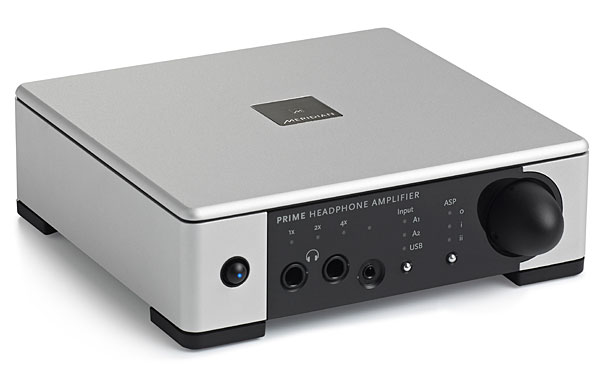| Columns Retired Columns & Blogs |
I can't fathom how anyone can watch a feature length film on a fifteen inch screen. It's all the more unfathomable when you add high quality sound to the equation.
With the Prime powered by its wall wart, I connected one of the Mac mini's Type A USB ports to the Prime's mini USB port using an adapter cable and listened again to the same recordings. The Prime's D/A section had a lighter, clearer balance than with the same track decoded by the Vega and with the headphones driven by the Prime. The Elgar/ Serenade sounded more ethereal, with less weight given to the low strings. Robert Silverman's piano had less body, though the tonal balance was less dark. The treble of the Audeze headphones with the Prime's D/A section sounded closer to that of the B&W P7s with the Vega decoding the digits, even though the same headphone output stage was being used.
The Prime Power Supply brought back some of the body of Silverman's Steinway, while keeping the delicacy of the high frequencies. "Get Lucky" sounded fuller with the Prime Power Supply than with the Meridian's wall wart, and while it didn't have the bottom-octave punch of the Vega, the bass guitar had well-defined leading edges, and such details as the one-in-the-bar block chords on the piano seemed better separated in space. Similarly, the delicate interplay between Elton John's and the late Lesley Duncan's multitracked voices in "Love Song," from John's Tumbleweed Connection (256kbps AAC file), was better resolved through the Meridian than it had been through the Vega.
This palpability (for want of a less overused word) reminded me of what I'd experienced with Meridian's awesome, cost-no-object 808.2 Signature Reference CD player, which I reviewed in April 2009. It was the first product I had auditioned that used Meridian's apodizing filter, which has a null at 22.05kHz, which is exactly half the CD's sample rate, thus eliminating all upstream ringing from digital filters at that frequency.

Comparisons
Although my reference for affordable USB DACs is the Halide HD ($495), which I reviewed in August 2012, the review sample has taken up residence chez Art Dudley. Art reviewed Meridian's Explorer D/A headphone amplifier ($299) in September 2013, and his favorable verdict was echoed by Stephen Mejias in the latter's March 2014 "Entry Level" column. As I still had Stephen's review sample, I spent an afternoon refreshing myself with the Explorer before comparing it with the Prime.
The Explorer definitely punches above its weight, and even drove the Audeze headphones with aplomb. It had a robust, rather forward balance overall with Phil Collins's performance of "Tearing and Breaking," from Johnny Boy Would Love This. . . . A Tribute to . . . John Martyn (256kbps AAC file), and I listened to several albums all the way through without listening fatigue (though my ears got sweaty). But when I repeated the listening with the Prime, matching levels as closely as possible by ear, the Explorer's high frequencies in the Elgar Serenade were slightly coarser, and in "Get Lucky," the Prime had a clearer, cleaner sound, with weightier low frequencies. The Explorer's overall sound was not as palpable, and I didn't get the same definite impression of image height with my binaural air-show recording. The MP3 artifacts in the Phil Collins download were not quite as easy to ignore with the Explorer.
But the Prime with Prime Power Supply costs more than 10 times the Explorer's price—it should sound better. So my next comparison was with the Antelope Zodiac Platinum D/A headphone amplifier, which cost $6018 with its Voltikus power supply when it was reviewed by Jon Iverson in September. With the Zodiac driving the Audeze LCD-X headphones, the bass guitar in "Tearing and Breaking" had a big, deep tone. Through the Meridian, the bass guitar's low register wasn't as majestic, though the Prime's delicate treble was slightly better at untangling Phil Collins's multiple multitracked vocal lines.

With every recording I listened to with the Zodiac, I kept reaching for the word majesty to describe its low frequencies. George Vakhnadze's piano in his recording of the Rachmaninoff concerto sounded less majestic through the Prime, with less authoritative lows. But the Antelope is nearly twice the Primes' combined price.
Summing Up
As I finish writing this review, I'm listening to a track someone posted to YouTube from the very first album on which I played bass guitar: the eponymous LP from the Back Alley Choir, produced by George Bellamy, rhythm guitarist for the Tornados, and released in the UK in 1972, on Yorkshire Television's short-lived York label. (My total royalties from sales of this album were around $1; Google reveals that copies are currently worth €500, and the single off the album almost €40!) Despite the file having been ripped with lossy compression and boasting little in the way of top-octave energy, the Meridian Prime with Prime Supply reproduced this four-decades-old recording with sweet-sounding voices and a palpability I hadn't expected. The sound of my plectrum-played Fender Precision Bass was eerily correct.
I was puzzled by the Prime's measured performance, as its digital section didn't optimally handle 24-bit data. Yet, other than the Prime's lack of weighty, forceful low frequencies when compared with the similarly priced Auralic and Antelope D/A processors, I liked the palpable way it had with imaging and its clean, clear, but smooth highs. It's tempting to chalk up this preference to the presence of its apodizing reconstruction filter, given my experience with other products that use such filters, but there are just too many variables to be sure. Still, my experience does suggest that the behavior of this filter outweighs shortfalls in ultimate resolution.
Which leaves me with the subject of value: Even without the Prime Power Supply, at $2000 the Prime is the same price as our current recommendation for a D/A headphone amplifier, Benchmark's DAC2 HGC, which was very favorably reviewed by Erick Lichte in February 2014. Unlike the Meridian, the Benchmark decodes DSD, and although it has long since left my listening room, I'm not sure if the Meridian with its stock power supply equals its sound quality. I am sure it does so when the Meridian is married to its Prime Power Supply—but that raises its price to $3250, which puts it in direct competition with the Auralic Vega ($3499). The Vega's DSD compatibility and authoritative lows swing the balance in its direction with well-recorded rock, though it's fair to point out that the Vega lacks a headphone output and an analog input. It is also fair to point out that while the Antelope Zodiac Platinum with its separate power supply has both of these features and handles DSD and ended up being preferred in my listening tests, it costs almost twice as much as the fully loaded Meridian.
A cautious recommendation, therefore, for this beautifully finished, excellent-sounding headphone amplifier—especially if you can spring for its companion Prime Power Supply.

I can't fathom how anyone can watch a feature length film on a fifteen inch screen. It's all the more unfathomable when you add high quality sound to the equation.

Hello,
the bottle neck in the Prime System is the PPS USB cable. Change the cable, please. I use the Audioquest Coffee between the PHA and the computer AND(!) between the PHA and the PPS.
I've asked Meridian why they deliver with the Prime Power Supply (PPS) an USB cable from Explorer. The audio quality level of the DACs is very different. They answered that the cable is to let the customers to TRY(!) the PPS as soon as possible. Later on they can choose a cable that they prefere :) And belive me you would prefere...